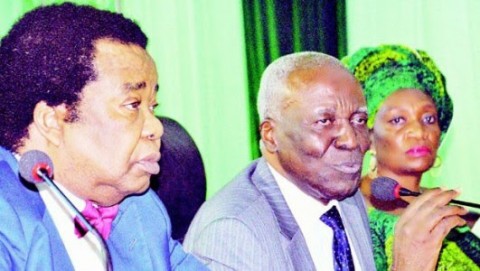CONFAB: Legislators to operate on part-time; no pension or severance allowance for former governors
Latest Headlines, News Thursday, June 5th, 2014
Except otherwise decided, henceforth, legislators at national and state levels would operate on part-time basis.
This was the decision of the on-going National Conference on Wednesday based on a recommendation by the Committee on Public Service headed by Engineer Ebele Okeke with Ambassador Adamu Aliyu as deputy chairman.
Conference also decided that payment of pension, life insurance and severance allowances where such existed are to be cancelled in line with what has been described as global best practices.
Former lawmakers at the Conference were quick to kick against the decision on the grounds that holding a political office is not the same thing as being a career public servant; and that the Legislature as presently constituted is operating on part-time basis because members do not sit for a whole week.
Conference also decided that former state governors and their deputies are to be exempted from payment of severance allowances, life insurance and payment of pension.
It was also decided and adopted that each state of the federation should have its own State Character Commission to protect the interest of minority ethnic groups in the state.
This implies that minority groups in the 36 states of the federation would soon enjoy equal treatment in appointments into public service of their different states.
Conference said its position is meant to address the obvious restrictions to the application of the Federal Character Principles at the state and local government levels.
Conference also accepted the recommendation that transfers into the directorate level of the civil service from outside be prohibited while there should be mandatory training as a basis for consideration for promotion to the middle management level of the service.
It was also decided that there is need for the civil service across the nation to operate common rules and practices so that the citizenry is not confronted with different procedures when dealing with each arm and tier of government.
The Committee’s recommendation that retirement age for civil servants, in line with what it calls international best practice, be fixed at 65 or forty years of active service; from the present practice of 60 years of age or 35 years of service was rejected by the Conference.
The argument was that those who have clocked 35 years in service or were 60 years old should give opportunity to younger ones with fresh ideas so that the service is not stagnated.
Conference also accepted unanimously the Committee’s recommendation for the creation of a separate Foreign Service Commission with a chairman and six commissioners, one of whom should be from each of the six geo-political zones.
For the disabled persons, the Conference adopted the Committee’s recommendation that efforts be made by government at all levels to make public offices disability-friendly by providing special access facilities in line with international charters and treaties.
It was also agreed that government at all levels should add allowances equivalent to Salary Grade Level 6 to the pay of each of the Persons Living with Disability to enable them employ an aide.
For efficiency in the public service, the Committee also recommended appointment of Secretary to Government of the Federation based on managerial capacity and rich civil service experience which it said can only be sourced from the pool of retired top civil servants.
It recommended the need to minimize disparities in the public sector pay, particularly between political appointees, public officers, civil servants and the staff of parastatals while emphasizing a friction-free relationship between the political leadership of ministries, departments and agencies and their top civil servants.
The Committee also asked the Conference to adopt its suggestion that henceforth, no political appointee, from ministers to commissioners and local government chairmen should employ special advisers, special assistants, and personal assistants or make any such appointments by any name called.
Instead, as a cost saving measure, such political office holders should utilize the staff of their ministries where it becomes necessary, as contained in Circular Reference Number B63833/73 of January 3, 2000.
As another cost-saving measure, the Committee recommended amendment of Section 147(3) of the 1999 Constitution which demands appointment by the President of at least one minister from each state of the federation.
Instead, it asked that the section be reframed to indicate that the President shall appoint not more than one minister from each state of the federation.
This recommendation is expected to restrict the President from appointing six more ministers from each of the six geo-political zones as has been the practice since the provision does not limit the president from appointing more than one minister from a state.
Full implementation of the Integrated Personnel and Payroll Information System (IPPIS) to ensure payroll integrity and eliminate ghost workers in the civil service, parastatals, the Legislature, the Judiciary, the military and para-military was also recommended.
Describing the budget as a major tool for attaining government’s socio-economic development objectives through sectoral allocation of financial resources, the committee said doubts have been raised recently on the efficacy of budgets.
It said these concerns have led to the rethinking of budgeting and financial management systems and has constituted one of the major pillars of public service reforms.
Going further, the Committee said the essence of budget reform and expenditure control is to make budget systems more transparent and ensure a more strategic approach to resource allocation and management.
In order to strengthen the budget performance and expenditure management process, the Committee recommended the establishment of a national framework for monitoring and evaluating budget performance.
It also recommended that every Appropriation Bill sent to the National Assembly should include key performance indicators and effective sanctions for non-performance.
In the fight against corruption, the Committee tasked anti-corruption agencies to ensure that every anti-corruption fight addresses the root cause of corruption such as poor remuneration in the public service, lack of social security, degenerated value system that encourages wealth accumulation and lack of social security.
The report called for diligent prosecution of all cases of corruption and, particularly, the creation of special courts for speedy determination of corruption cases; while also emphasizing the need for monitoring of the lifestyle of public officers and enforcement of the provisions of Code of Conduct Bureau.
On incentives for public servants, service welfare and productivity, the Committee said the civil service is simply bereft of any meaningful benefit, especially since the implementation of the monetization policy.
It observed that retirees under the old pension scheme have been exposed to a lot of hardships due to irregular payment of pension and gratuity; a situation it said has been compounded by non-compliance with the constitutional provision for periodic review of pension.
In its recommendations, the Committee said anyone indicted for corruption in relation to pension administration should be promptly brought to justice.
The Committee urged the Conference to demand that relevant sections of the Pensions Reform Act which requires that investment of part of the funds from the Contributory Pension Scheme in real estate sector to boost availability of mortgage be adhered to.
It said operations of the National Health Insurance Scheme be overhauled because contributors to the scheme are currently left without coverage as their health requirements and those of members of their families “are just not being met under the Scheme.”
On labour issues and the minimum wage, the Committee recommended that since the minimum wage is fixed at a level just above the poverty line, and it is the duty of the Federal Government to ensure that the pay of every Nigerian is above the poverty line, it was necessary to have it retained in the Exclusive Legislative.
It was the recommendation of the Committee that a new sub-section be introduced in the 1999 Constitution that would compel government to review public sector pay every five years to take cognizance of trends in the cost of living.
In addition, it said a new study of job content and pay structure of both the public and the private sectors should be swiftly undertaken to ensure that comparable work in the public sector vis-à-vis the private sector attracts comparable pay.
As a premise for harmonization of pay in the paraststals and agencies with what obtains in the civil service, the Committee called for immediate job evaluation in the entire public service.
This, it stated, would not only restore relativity between the pay in the parastatals and agencies vis-avis that of the civil service, but is also capable of reducing the size of the recurrent budget.
Related Posts
Short URL: https://www.africanexaminer.com/?p=12117






















